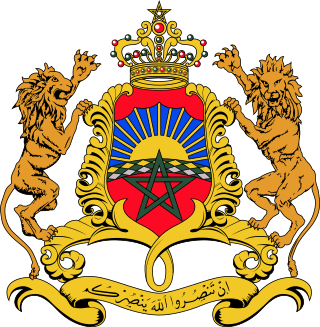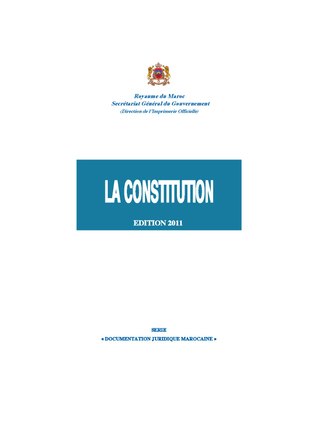A constitutional amendment is a modification of the constitution of a polity, organization or other type of entity. Amendments are often interwoven into the relevant sections of an existing constitution, directly altering the text. Conversely, they can be appended to the constitution as supplemental additions, thus changing the frame of government without altering the existing text of the document.

Referendums in the United Kingdom are occasionally held at a national, regional or local level. Historically, national referendums are rare due to the long-standing principle of parliamentary sovereignty. There is no constitutional requirement to hold a national referendum for any purpose or on any issue however the UK Parliament is free to legislate through an Act of Parliament for a referendum to be held on any question at any time.

There are three types of elections in Denmark: elections to the national parliament, local elections, and elections to the European Parliament. Referendums may also be called to consult the Danish citizenry directly on an issue of national concern.
In Australia, referendums are public votes held on important issues where the electorate may approve or reject a certain proposal. The term is commonly used in reference to a constitutional referendum which is legally required to make a change to the Constitution of Australia.
The 1984 Australian referendum was held on 1 December 1984. It contained two referendum questions, neither of which passed. As of 2022, this is the last referendum in which any state voted in favour of a constitutional amendment.

Malta elects on a national level 6 MEPs representing Malta in the European Parliament, on a district level the legislature, On a local level the Local Councils and on a community level the Administrative Committees.

Parliamentary elections were held in Morocco on 3 June 1977. Elections had previously been held in 1970, but Parliament had been dissolved in March 1972 and a new constitution approved in a referendum in the same month. Fresh elections were scheduled for May, but were later indefinitely postponed.

A constitutional referendum was held in Morocco on 1 March 1972. The new constitution replaced that approved by referendum in 1970, and was drawn up after an attempted coup in July 1971 forced King Hassan II to accept the need for a broader government.

A constitutional referendum was held in Morocco on 23 May 1980. The referendum asked whether voters approved of changes to article 21 of the 1972 constitution, which concerned the Regency Council, and reduced the age of majority for the King from 18 to 16. The changes were approved by 99.6% of voters, with a 96.8% turnout. A second referendum was held a week later on articles 43 and 95.

A constitutional referendum was held in Morocco on 30 May 1980. The referendum asked whether voters approved of changes to articles 43 and 95 of the 1972 constitution, which would extend the mandate of Parliament from four to six years. The changes were approved by 96.7% of voters, with a 90.8% turnout.

A referendum on the Arabic–African Federation Treaty was held in Morocco on 31 August 1984. The treaty would create a union of states between Morocco and Libya as part of a first step towards a "Great Arab Maghreb". It was approved by 99.98% of voters, with a 97% turnout.

A referendum on extending the parliamentary mandate was held in Morocco on 1 December 1989. As elections had been held in 1984, the six-year term for Parliament due to expire in 1990. The decision was approved by 100% of voters, with a 98.8% turnout.

A constitutional referendum was held in Morocco on 4 September 1992. The amended constitution increased the number of seats in the Parliament from 306 to 333, with the number of directly elected seats rising from 204 to 222. It also allowed the Prime Minister to appoint the rest of the cabinet, and for legislation to be promulgated a month after being passed by the Parliament, regardless of whether the monarch had given assent. The changes were approved by 99.96% of voters, with 100% voting in favour in major cities and three of the four provinces in the disputed territory of Western Sahara. Voter turnout was reported to be 97.29%. Fresh elections were held the following year.

A constitutional referendum was held in Morocco on 13 September 1996. The new constitution created a bicameral Parliament by adding the Assembly of Councillors to the existing Assembly of Representatives. The 270-seat Assembly of Councillors would be indirectly elected by local councillors, chambers of commerce (81), and trade unions (27), whilst the 325-seat Assembly of Representatives would now be entirely directly elected. The changes were approved by 99.5% of voters, with an 85% turnout. Fresh elections were held the following year.

A constitutional referendum was held in Morocco on 15 September 1995. The amendment was made in order to change the date on which the annual Finance Act must be passed. It was approved by 99.6% of voters, with a 70.2% turnout.

A referendum on constitutional reforms was held in Morocco on 1 July 2011. It was called in response to a series of protests across Morocco that began on 20 February 2011 when over ten thousand Moroccans participated in demonstrations demanding democratic reforms. A commission was to draft proposals by June 2011. A draft released on 17 June foresaw the following changes:

The Constitution of Morocco is the supreme law of the Kingdom of Morocco. The constitution defines Morocco as a constitutional monarchy and lays out the fundamental rights of Moroccan citizens, it also defines the basis and structures of government, the council of ministers, and the parliament.
A referendum is a direct vote in which an entire electorate is asked to either accept or reject a particular proposal. This article summarises referendum laws and practice in various countries.
The European Union Withdrawal Agreement Bill 2017–19 was a private member's bill of the Parliament of the United Kingdom to make provision for the holding of a “public vote” (referendum) in the United Kingdom and Gibraltar following the conclusion of negotiations by Her Majesty's Government and the European Union on whether to support the proposed exit deal for the United Kingdom's withdrawal from the European Union or to remain a member state of the EU. The bill was sponsored by English Labour Co-operative MP Gareth Thomas. The bill failed upon the conclusion of the parliamentary session in November 2019, and withdrawal took place on 31 January 2020 without a second referendum.

This national electoral calendar for 2021 lists the national/federal elections held in 2021 in all sovereign states and their dependent territories. By-elections are excluded, though national referendums are included.






